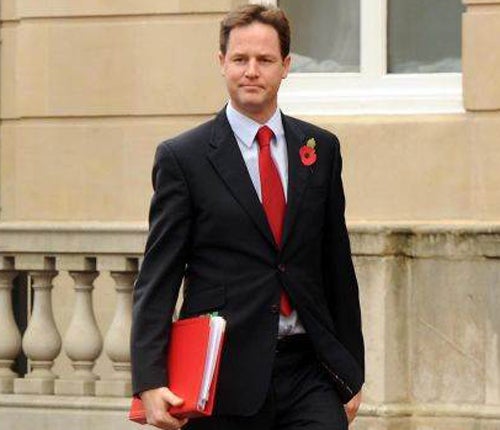Tories and Lib Dems discuss bold election pact

The conservatives are considering an informal pact with the LibDems under which they would urge people to make Nick Clegg's party their second choice at the next general election.
The historic pact, which could severely dent Labour's prospects of returning to power, would be proposed in the event of a Yes vote in next May's referendum on whether to replace the current first-past-the-post system with the alternative vote (AV).
Under the latter, people rank candidates in order of preference. The one who comes last drops out and second preferences are redistributed until one candidate wins more than 50 per cent of the votes cast.
In return, David Cameron would ask Mr Clegg to urge voters to make the Conservatives their second choice. Some Tory MPs are advocating such an agreement to keep Labour out of power. Although Liberal Democrat MPs are more cautious, they admit a pact would be a possibility if the Coalition proves successful. An unofficial pact is seen as more realistic than a more formal share-out of seats under which the Tories and Liberal Democrats did not stand against each other in some seats, including the 57 held by Mr Clegg's party.
A formal deal on seats has been suggested by Nick Boles, a Tory MP and prominent supporter of Mr Cameron's drive to modernise his party. But the Tory and Liberal Democrat leaderships admit that would provoke strong opposition from local party activists and have reassured them the two Coalition parties will both fight every seat at the next election.
Although Mr Cameron will urge voters to stick with the current system, there has been a growing recognition in Tory circles since the formation of the Coalition that a switch to AV could help the party's prospects. Ironically, Labour was the only party to back an AV referendum at this year's general election. Its pledge helped Mr Clegg persuade the Tories to allow a plebiscite as part of the Coalition agreement. Tory MP David Mowat, who had a majority of 1,553 over Labour in his Warrington South constituency in May, said: "If we did have AV and we put Lib Dems second and they put us second, it would be very likely to give us a better result than we might achieve under first-past-the-post. There could be a squeeze effect on Labour."
The down side for the LibDems is that such a voting pact could close the door to a Coalition deal with Labour if it emerged as the largest party after an election. One senior Liberal Democrat said: "This would be a win-win for the Tories. They are never going to form a Coalition Labour, but we might."
Liberal Democrats are confident that the AV referendum can be won even though the No campaign has been faster out of the starting blocks. They will try to make it a vote on the benefits of "coalition politics" rather than the Government's record. They believe the public like the idea of parties working together, even if they are worried about the spending cuts announced last month by George Osborne, the Chancellor.
Join our commenting forum
Join thought-provoking conversations, follow other Independent readers and see their replies
Comments
Bookmark popover
Removed from bookmarks